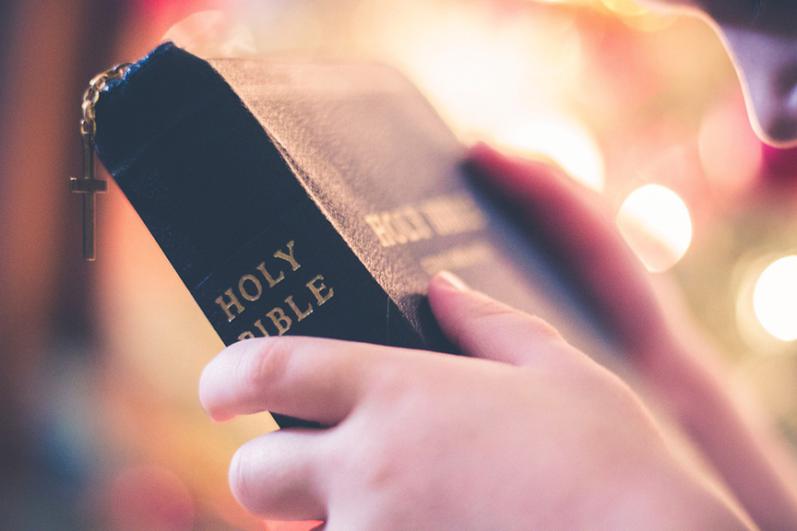The Bible and the Liturgy
In recent columns, we have been looking at the library in the parish sacristy. Let's take a short detour to the library that probably every Catholic and Christian home has -- it does not take up much space on a shelf -- in fact, it's all one volume. You can even fit this library in a quick download on your phone or other electronic device: the Holy Bible.
It really is a library unto itself. For us Roman Catholics, it is in two major sections: the Old Testament, sometimes called Hebrew Scriptures, and the New Testament. Within the Old Testament that we Catholics use, there are 46 books, while the New Testament has 27 books. Each book is of a particular or peculiar genre -- remember that word from English literature? There were novels, short stories, poems, odes, fiction, non-fiction, and many of those have subcategories. So, in the Bible there are various genres.
Not all the books of each testament are the same. And each genre is not in each testament. Some books are sacred narratives; some are reflective works; there is music, Old Testament only -- no musical notations, though -- the Psalms.
The New Testament has a very special type of book called a Gospel. There are four of them, each commonly known by the name of the inspired author customarily associated with the book. They are "peculiar" to the New Testament, just as the Psalms are peculiar to the Old Testament. The New Testament is also composed of letters from various apostolic authors and even an anonymous one: Hebrews.
This book or library plays the most important role in our Roman Catholic liturgical life.
First, as we saw in two previous articles, the readings proclaimed at our liturgical celebrations all come from, and only from, the Bible. And, as we'll see in coming articles, it's not just at Mass that this is true; every liturgical event has at least a short reading from one or the other of the biblical books.
Of all the books in both testaments, the Psalms appear most frequently throughout our liturgical celebrations. It may be as a responsorial (every Mass), or as an antiphon, or as a hymn in metrical form.
Next, we can say that the Bible shapes the liturgy both as mentioned above and, for instance, even in some of our liturgical actions. Baptism -- John's baptism of Jesus; Philip's' baptism of the Ethiopian eunuch; Jesus' actions at the Last Supper: "taking, blessing, breaking, giving;" prayer at various times of the day by the apostles in the Book of Acts.
Less obvious but nonetheless true are the images, allusions, symbols, and metaphors taken from the Bible that are in our prayers.
The Lord's Prayer is perhaps the most obvious.
Next would have to be the Eucharistic Prayers. Not only do we harken back to the Lord's words at the Last Supper, but there are phrases taken from the Bible that we probably hear as familiar to us but can't exactly recall why.
Think of the Gloria we sing or recite on Sundays and other solemnities and feasts. Its very first words are those of the angels at the Birth of the Messiah. The rest is an expansion of the angels' hymn, also echoing praise of the Triune God with allusions to both Old and New Testaments.
Another "angelic hymn," the Holy, Holy, Holy, is our response to the preface of the Eucharistic Prayer. It either quotes or is inspired by verses in Isaiah (6:3), Matthew (21:9), and Revelation (4:8).
Following the example of the apostles and the other members of the early Church who gathered at the prescribed (i.e. Jewish) times for daily prayer, the Church's daily prayer is the Liturgy of the Hours (sometimes you'll hear it referred to as the Divine Office or the Breviary).
If you listen closely throughout Holy Mass, attending to the prayers as well as the readings (remember you are participating by your attention), you will hear how very biblical the Roman Catholic liturgy really is.
If you want more insight into the Bible and the liturgy, here are two suggestions. One is a classic (reprinted multiple times since its first English appearance in 1954): "The Bible and the Liturgy," by the late Cardinal Jean Danielou, SJ. And, just a few weeks ago, Liturgical Press released a new version of the Roman Catholic Bible, "Liturgy and Life: Study Bible." This edition contains not only the biblical texts but helpful footnotes and citations of phrases and sentences as they appear throughout our liturgies. The team of editors has done a magisterial (in this case, teaching without being in a classroom) job underlining for all of us the biblical basis of our liturgical life.


















